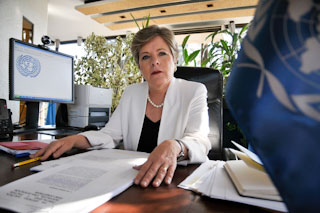"Social Responsibility Should Be Part of a Country's Overall Development Strategy"
Alicia Bárcena inaugurated a dialogue on the role of parties involved in the implementation of corporate social responsibility.

(28 July 2010) "Corporate social responsibility (CSR) is an issue that crosses through all areas and levels of the social fabric with the aim of developing fairer, stable and prosperous societies," stated today Alicia Bárcena, Executive Secretary of the Economic Commission for Latin America and the Caribbean (ECLAC).
Bárcena inaugurated the Dialogue on the Role of Parties Involved in Implementation of Corporate Social Responsibility in Santiago. The meeting was convened by the Executive Secretariat for Global Development (SEDI) of the Organization of American States (OAS), with support from the Canadian International Development Agency (CIDA) and, in partnership with ECLAC, the Young Americas Business Trust (YABT) and Business Forum.
Participating in the meeting were representatives of the governments of Canada and Chile, of international and multilateral bodies such as ECLAC, the OAS and the ILO, of United Nations Global Compact, the private sector and academic, business and non-governmental organizations.
Its objective is to establish a shared view of CSR among stakeholders and exchange ideas about how to implement it in the region under the framework of public-private partnerships.
In her presentation, the Executive Secretary of ECLAC stressed that the responsibility of promoting economic and social progress is not the task of one sole party (government or private sector), but the work of the entire society.
"Social responsibility is the essence of common welfare and must be part of a country's overall development strategy," she said.
She also noted the joint work of ECLAC and the OAS over the past several years in following up and disseminating the issue.
"We want to propel the creation of a corporate awareness with a collective view so that everyone can fully participate in the construction of equality," she stated. ECLAC recently published the document Time for Equality. Closing Gaps, Opening Trails, presented during its Thirty-third Session, in which it suggests a new social pact between the State, market and society for sustainable, fair and equal development.
Bárcena said that instruments like the royalty on the extraction of non-renewable natural resources are essential for creating new and different productive and innovation activities to replace the extracted resource and transfer wealth, and not only empty mines, to the future generations.
She added that CSR is not limited to big companies. In fact, over 95% of companies in the region are small or medium-sized, contributing to almost 50% of regional GDP but creating up to 70% of all jobs.
With regard to UN Global Compact - an initiative of social responsibility created ten years ago and which currently has 800 members - Bárcena explained that during a meeting this past June in New York, the UN Secretary-General reviewed the progress and pending matters in the compliance of the Millennium Goals.
According to the UN Global Compact, although CSR has increasingly become a priority in the business agenda, many companies have yet to implement key policies on human rights and against corruption.
At a regional level, the actions of governments, parliaments and the private sector have led to an effective implementation of CSR norms in Peru, Chile, Costa Rica and Argentina, for example, while some universities have created observatories to collect data and assess CSR.
For enquiries, please contact ECLAC's Public Information and Web Services Section. E-mail: dpisantiago@cepal.org ; telephones: (56 2) 210 2040/2149.
Country(ies)
- Latin America and the Caribbean
Contact
Public Information Unit
- prensa@cepal.org
- (56 2) 2210 2040